3rd Year Final Exam 2023, will be held on the year-2025 (এটা ২০২5 সালের এক্সাম এর জন্য সাজেশান)
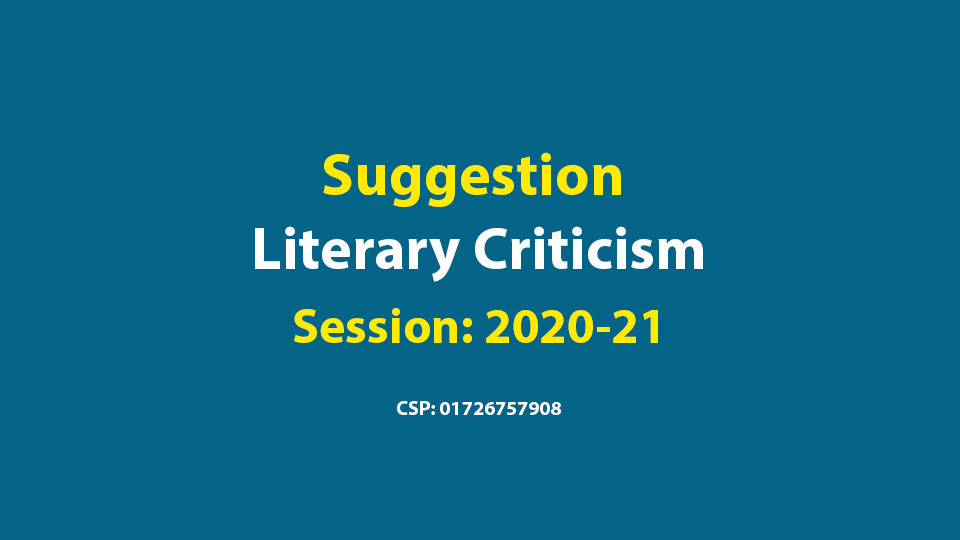
[Join CSP Online Private Classes | ফেসবুকে প্রাইভেট] Call me: 01726757908 || Whatsapp me: 01726757908 (Text Only)
@ জুমে লাইভ ক্লাস হয়।
@ লেকচার শিট + হ্যান্ড নোট্স পাবে
@ সপ্তাহে ৩ দিন ১ ঘণ্টা করে পড়ান হয়।
@ শনি-সোম-বুধ, রাত 8.30-9.30 টা
@ ক্লাস রেকর্ড করে গ্রুপে শেয়ার করা হয়।
@ পেইড জুম সফটওয়্যার, তাই নিরবচ্ছিন ১ ঘণ্টা ক্লাস হয়
@ নিরবচ্ছিন্ন বিদ্যুৎ আছে, সো বিদ্যুৎ যাওয়ার বা রেকর্ড ক্লাস হারিয়ে যাওয়ার ভয় নেই।
—0—
Part – C
Poetics
- *** Discuss Aristotle’s concept of tragedy.
- *** How does Aristotle compare and contrast tragedy with epic?
- *** Discuss Aristotle’s views on Three Unities.
- Discuss Aristotle’s conception of complex plot.
An Apology for Poetry
- *** How does Sydney defend poetry from the allegations brought by Gosson/puritans?
- *** How does poetry is superior to philosophy/ philosophers and history/ historians?
- Discuss the role and functions of the poetry as stated by Sidney.
Preface to Shakespeare
- *** How does Johnson defend Shakespeare against the charge for the violation of unities of time and place?
- *** Discuss Johnson as a modified Neo-classical critic / critic of Shakespeare.
- *** How does Johnson glorify Shakespeare as a poet of Nature?
- Comment on Johnson’s evaluation of Shakespeare’s tragedy.
- Discuss Johnson’s view on Shakespeare’s characters.
Preface to Lyrical Ballads
- *** Discuss Lyrical Ballads as a manifesto of the romantic age.
- *** Comment on Wordsworth’s assertion of the language/diction of poetry.
- *** Discuss the historical significance of Preface to the Lyrical Ballads.
Biographia Literaria
- *** Elucidate Coleridge’s theory of poetry.
- *** Discuss Coleridge’s major objections to Wordsworth’s poetry.
- How Coleridge define prose, poetry, and poem in Biographia Literaria?
—0—
Part-B
- Describe the elements of tragedy.
- Discuss Aristotle’s views on imitation.
- Discuss Aristotle’s view on pity and fear / Catharsis.
- What are dramatic unities?
- Discuss Aristotle’s views about ideal tragic hero.
- What does Sidney say about the condition of English drama in his time?
- Why poetry is superior to history?
- Describe Sidney’s views on the capacity of English language.
- What are the four objections raised against poetry in “An Apology for Poetry”?
- Why did Sidney write “An Apology for Poetry”?
- How does Dr. Johnson differentiate between Shakespeare’s tragedies and comedies?
- How does Johnson say that Shakespeare is more successful in comedy than tragedy?
- What are the reasons behind Shakespeare’s universal popularity?
- Shakespeare has no heroes, but heroines- Explain.
- What does Johnson say about Shakespeare’s violation of the unities?
- Write a short note on Neo-classicism.
- According to Wordsworth, what is the connection between poetry and feelings?
- Why did Wordsworth choose the incident and situation from the common man’s life as the subject matter of his poetry?
- Comment on Wordsworth’s comprehensive soul of a poet.
- Why did Wordsworth write Preface to the Lyrical Ballads?
- How does Wordsworth justify meter in poetry?
- What is the role of meter or rhyme in the composition of poetry?
- Describe Coleridge’s views on Fancy and Imagination.
- Describe Coleridge’s phrase Willing suspension of disbelief.
- What is Coleridge’s objection to Wordsworth’s selection of characters in his poems?
———————–
Short Notes
- Hamartia
- Catharsis
- Poetic Diction
- Lyrical Ballads
- Tragedy
- Comedy
- Sidney’s The antiquity of poetry.
Previous Questions
Question of 2021
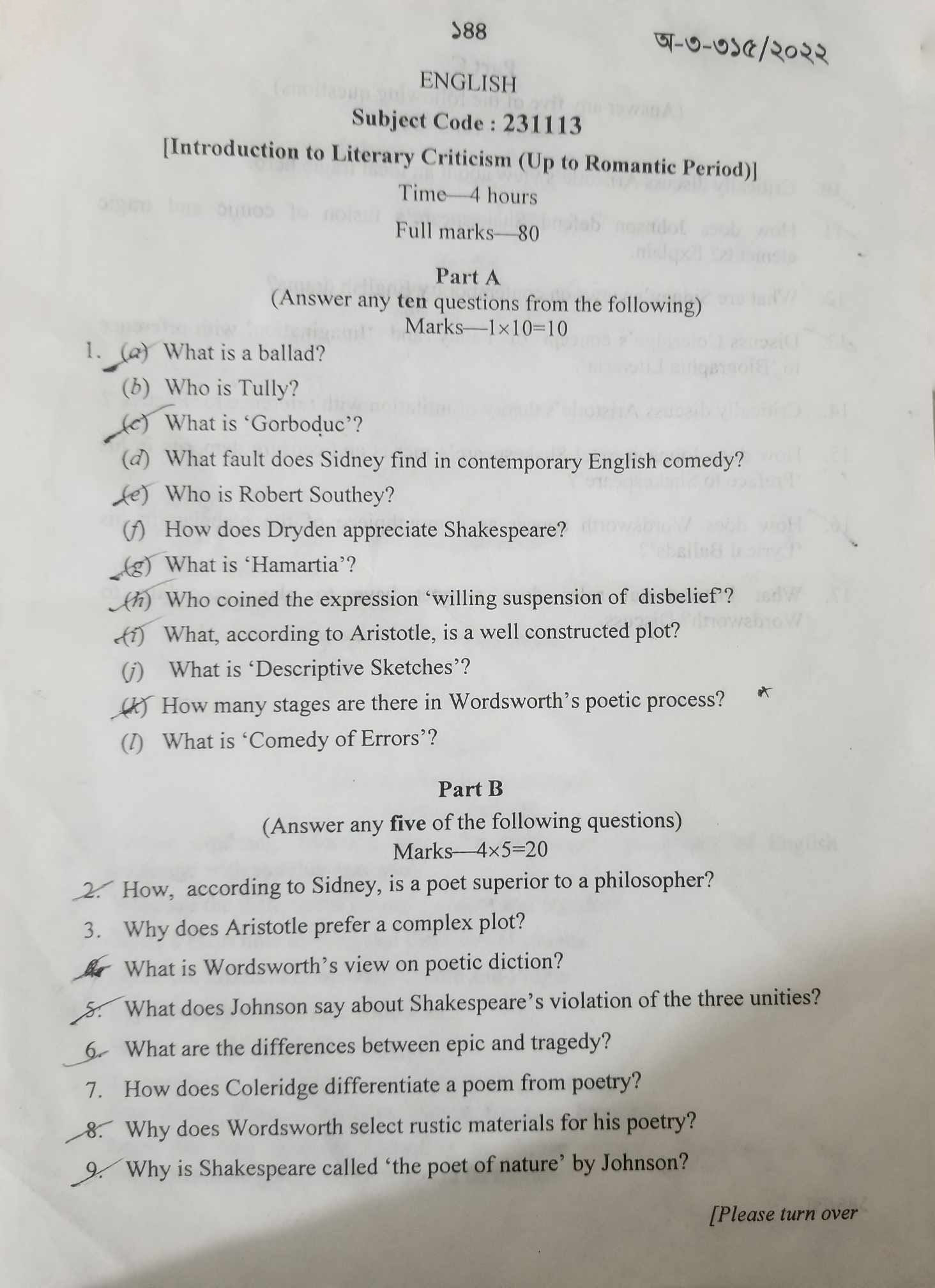
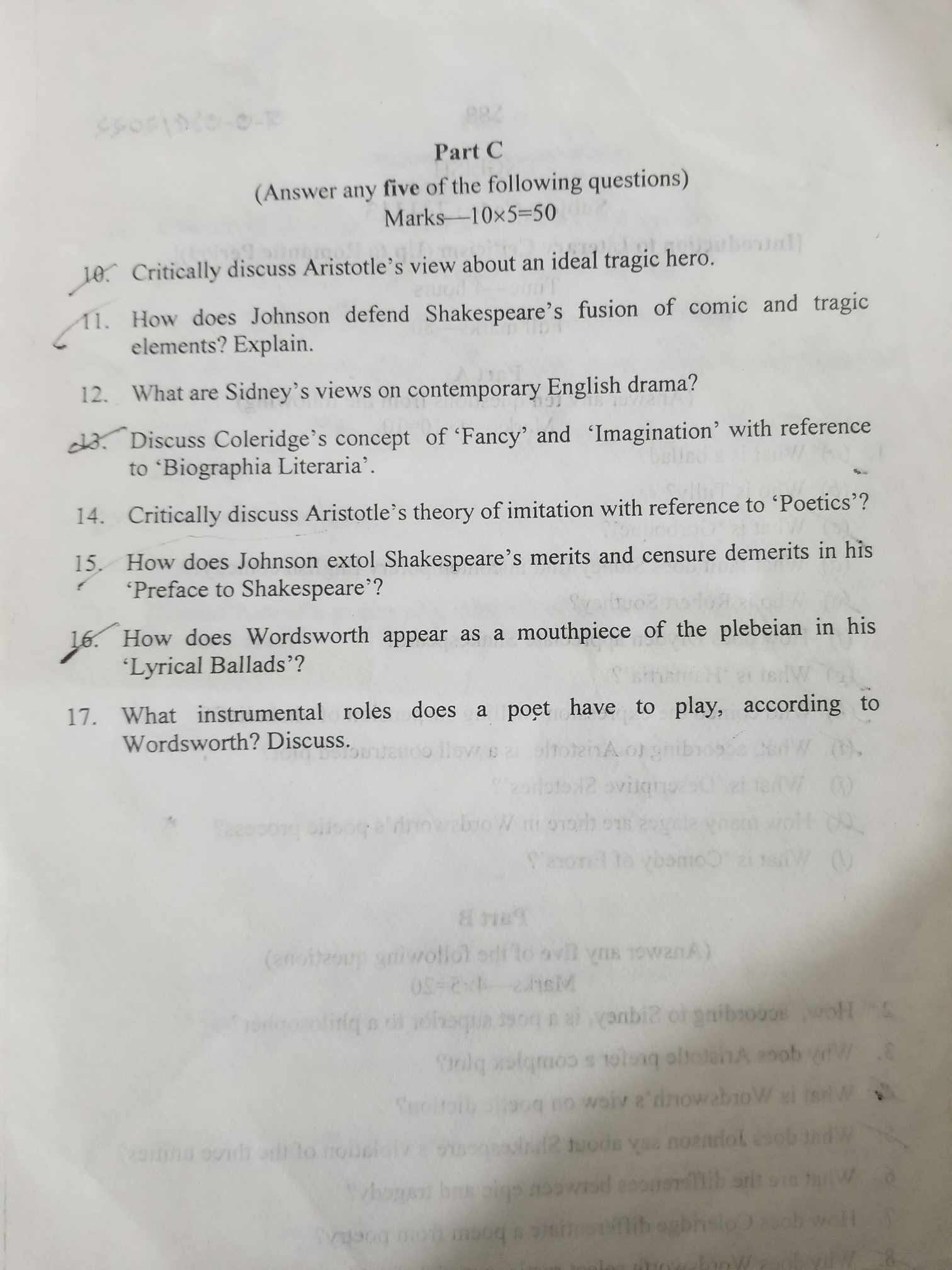
Question of 2021
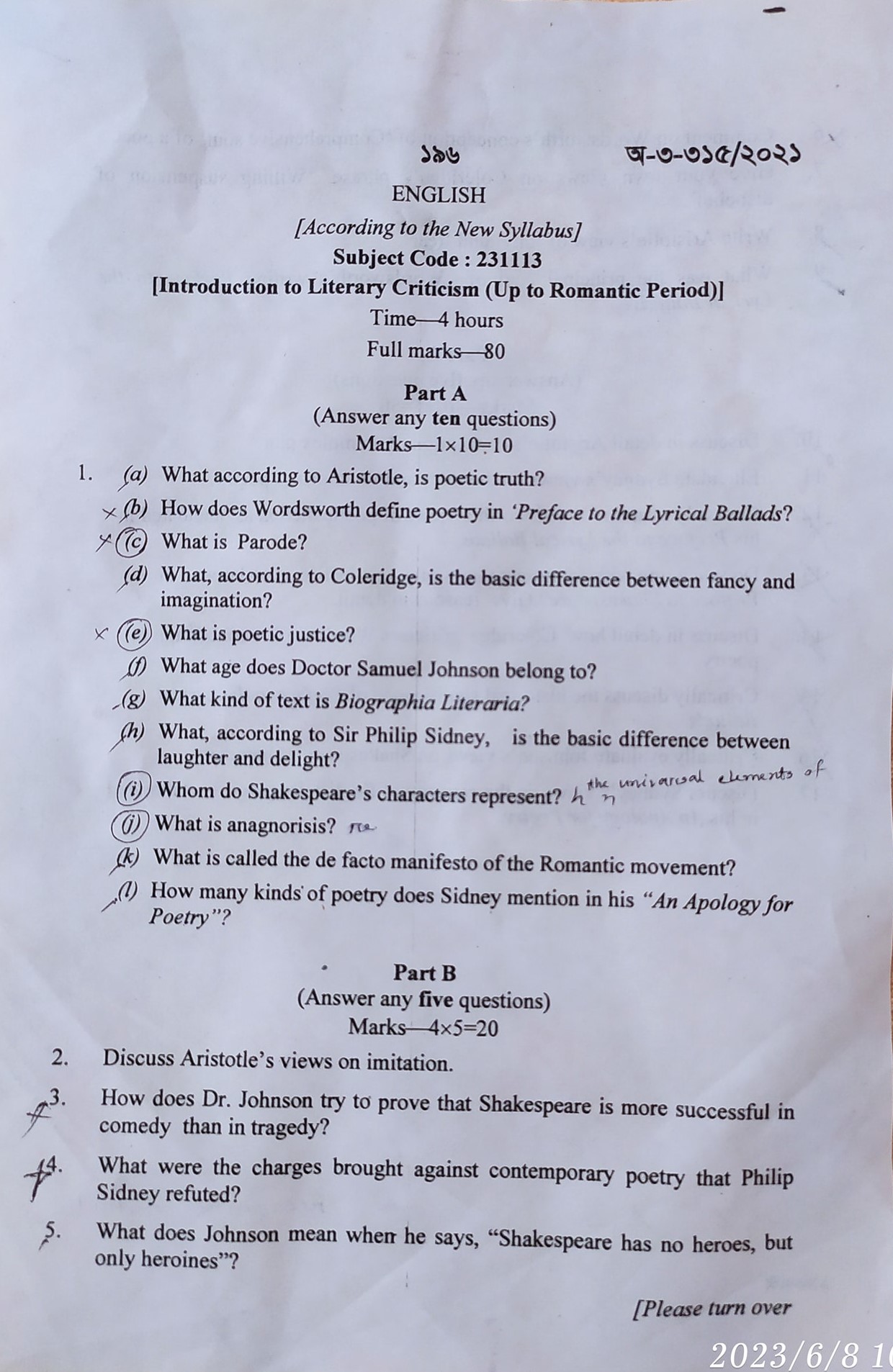
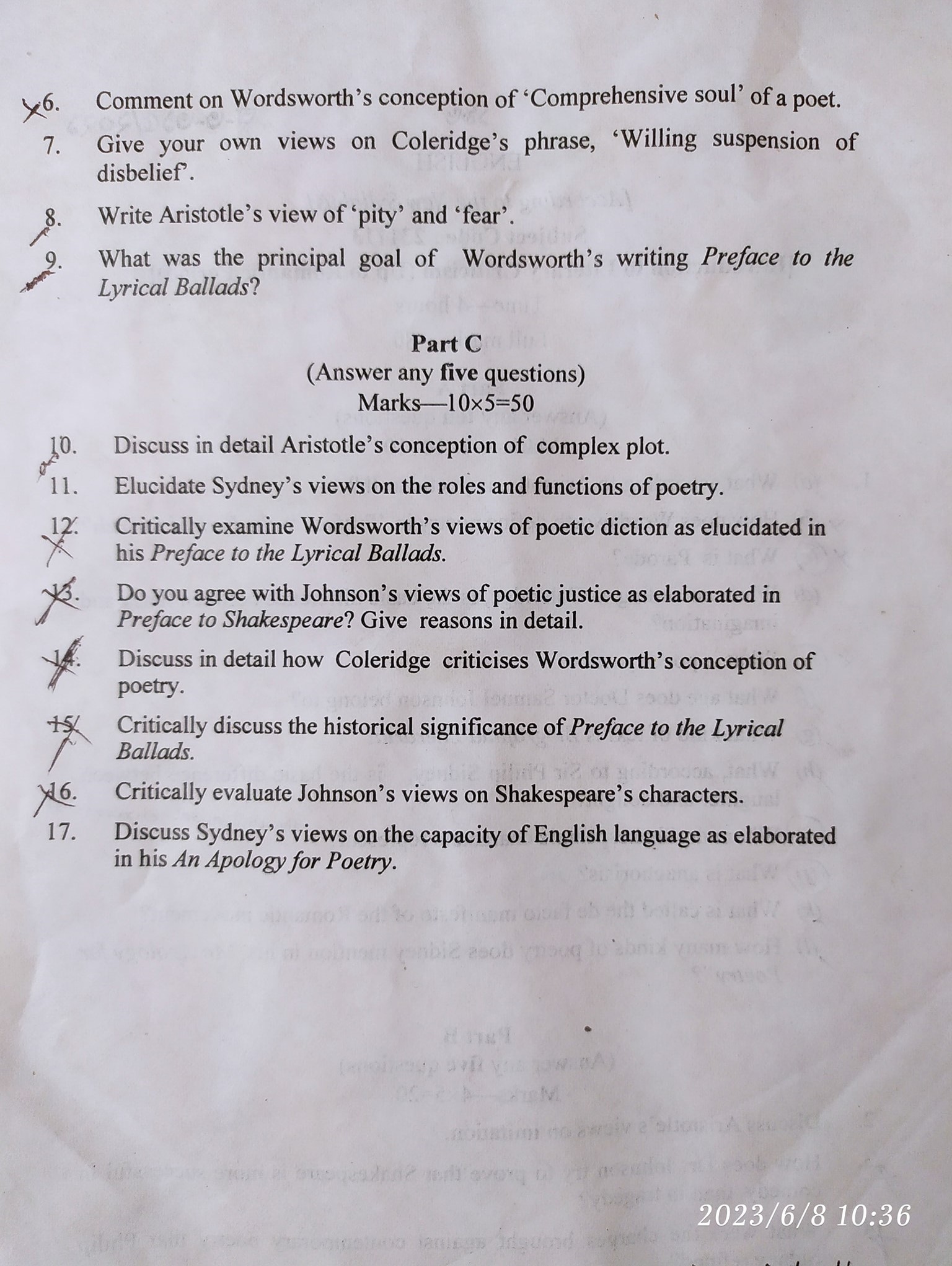
Question of 2020
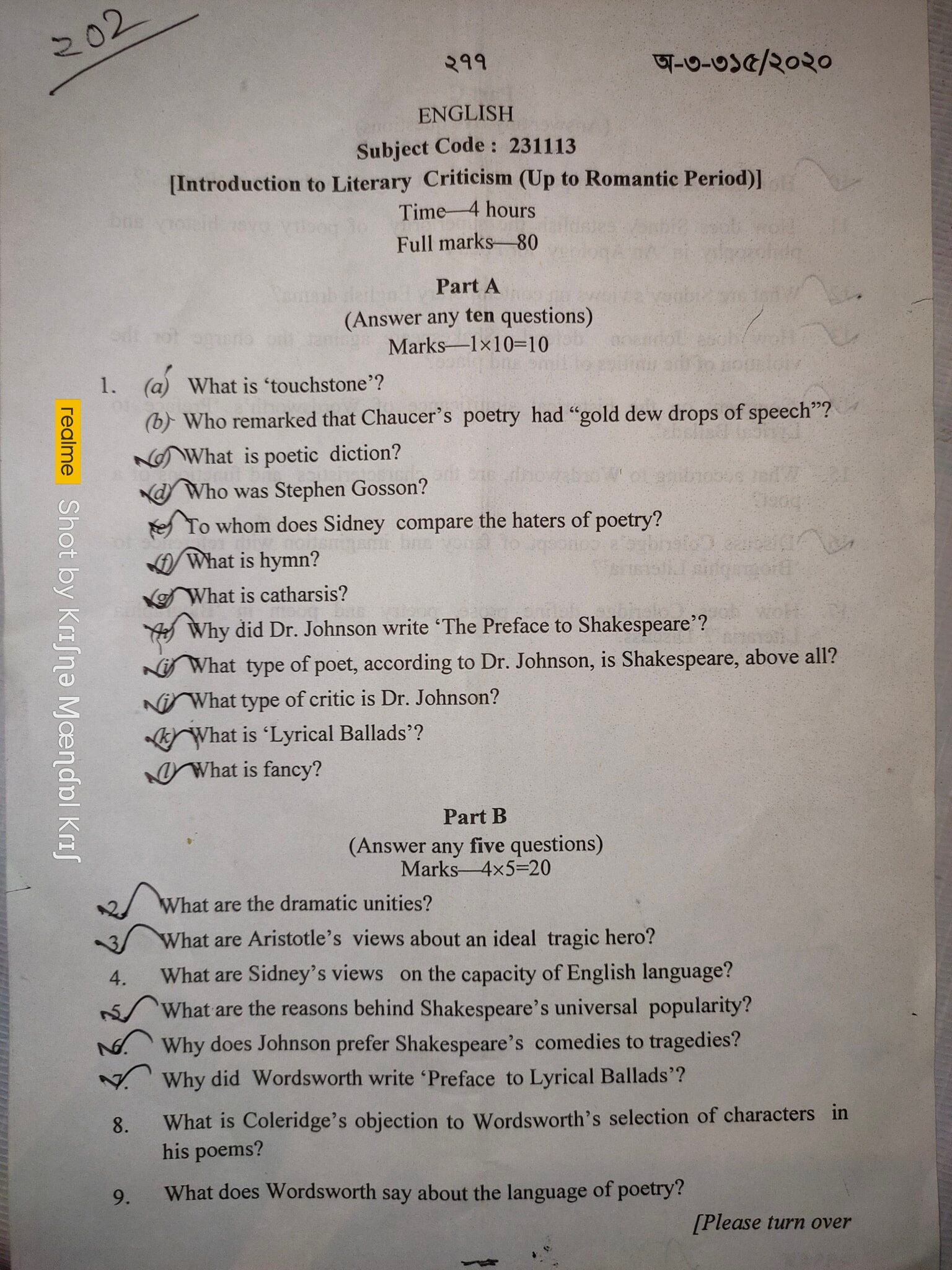
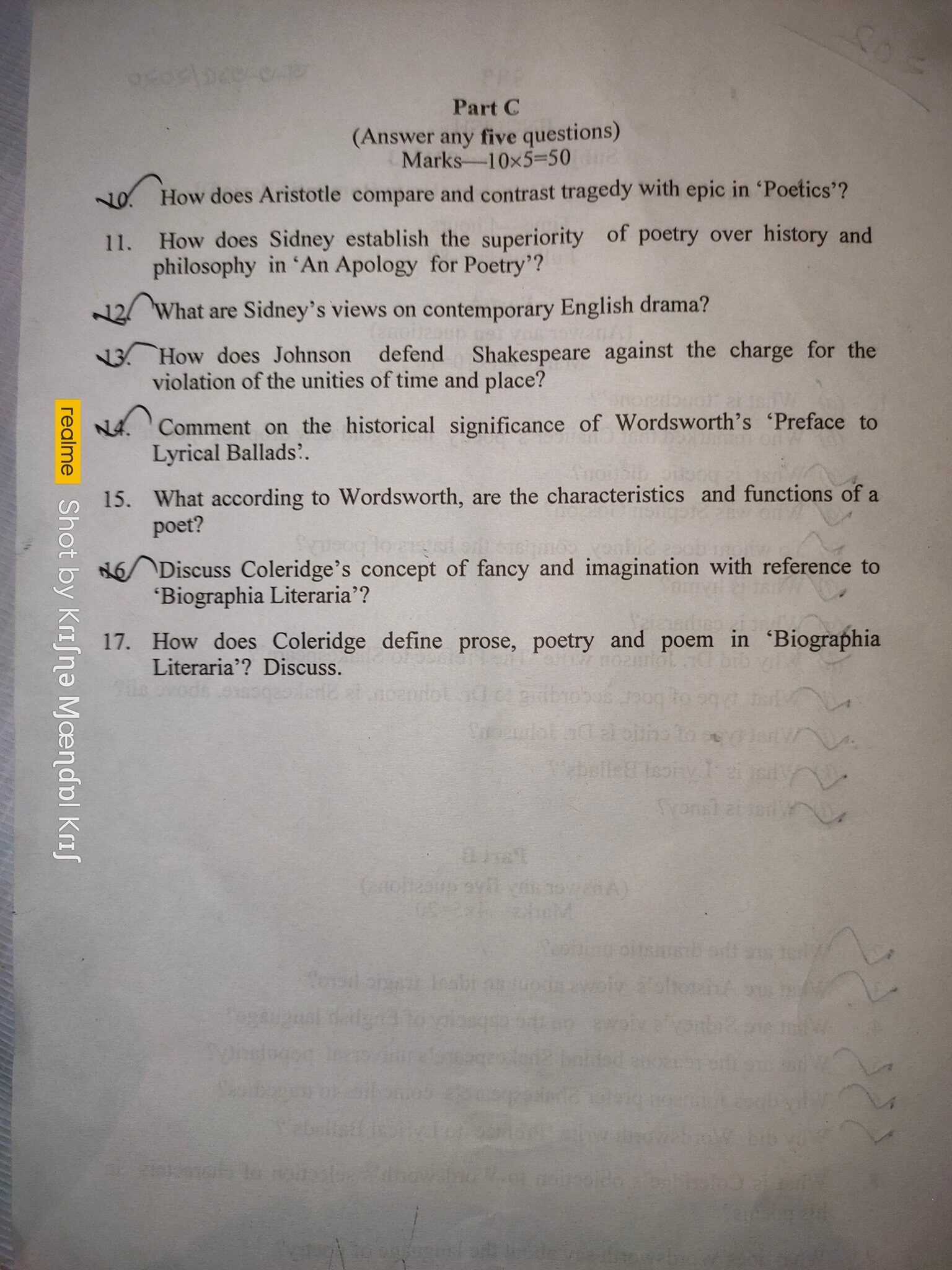
NB: নিচের সাজেশান টা আগের বছরের। উপরের টা তোমাদের।
Part – C
Poetics (2 questions expected to be common)
- Discuss Aristotle’s concept of tragedy.
- Discuss Aristotle’s concept of Imitation
- Discuss Aristotle’s views on Three Unities/ plot.
- Discuss Aristotle’s views on the ideal tragic hero/features of a tragic hero.
An Apology for Poetry
- Discuss the qualities and functions of the poet as stated by Sidney.
- How does Sydney defend poetry from the allegations brought by Gosson/puritans?
Preface to Shakespeare (2 questions expected to be common)
- How does Johnson defend Shakespeare’s mixing of comic and tragic elements?
- Discuss Johnson as a modified Neo-classical critic
- How does Johnson glorify Shakespeare as a poet of Nature?
- Comment on Johnson’s evaluation of Shakespeare’s tragedy.
Preface to Lyrical Ballads
- Comment on Wordsworth’s assertion of the language/diction of poetry
- Wordsworth is a poet of common man-discuss.
- Discuss Lyrical Ballads as a manifesto of the romantic age.
Biographia Literaria
- Elucidate Coleridge’s theory of poetry.
- Discuss Coleridge’s major objections to Wordsworth’s poetry.
—0—
Part-B
- Describe the elements of tragedy.
- Compare and contrast epic and tragedy.
- What does Sidney say about the condition of English drama in his time?
- Why poetry is superior to history?
- What are the four objections raised against poetry in “An Apology for Poetry”?
- Why did Sidney write “An Apology for Poetry”?
- How does Dr.Johnson differentiate between Shakespeare’s tragedies and comedies?
- What does Johnson say about Shakespeare’s violation of the unities?
- Write a short note on Neo-classicism.
- What was the aim of Wordsworth in writing Preface to the Lyrical Ballads/Why did Wordsworth write Preface to Lyrical Ballads?
- According to Wordsworth, what is the connection between poetry and feelings?
- Why did Wordsworth choose the incident and situation from the common man’s life as the subject matter of his poetry?
- How does Wordsworth justify meter in poetry?
- What is the role of meter or rhyme in the composition of poetry?
- Describe Coleridge’s views on Fancy and Imagination.
- What is Coleridge’s objection to Wordsworth’s selection of characters in his poems?
———————–
Short Notes
- Hamartia
- Catharsis
- Poetic Diction
- Lyrical Ballads
Third Year 2020
Part-C
- How does Aristotle glorify tragedy over epic poetry?
- Discuss Aristotle’s concept of Imitation
- Discuss Aristotle’s concept of Three Unities.
- Discuss the qualities and functions of the poet as stated by Sidney
- How Sidney gives superiority to Poetry over history?
- Discuss Sidney’s objection to the contemporary English Drama
- How Johnson defends Shakespeare’s mixing of comic and tragic elements?
- Discuss Johnson as a modified Neo-classical critic
- How does Johnson glorify Shakespeare as a poet of Nature?
- Discuss Wordsworth’s preface to lyrical ballads as a manifesto/landmark of the romantic age
- Comment on Wordsworth’s assertion of the language of poetry
- Wordsworth is a poet of common people-discuss.
- Elucidate Coleridge’s theory of poetry.
- Discuss critically Coleridge’s concept of Fancy and Imagination.
Part-B
- Describe the elements of tragedy.
- What does Aristotle say about dramatic unities?
- What are the characteristics of an ideal tragic hero?
- What does Sidney say about the condition of English drama in his time?
- What are the four objections raised against poetry in “An Apology for Poetry”?
- Why did Sidney write “An Apology for Poetry”?
- Why is Shakespeare called “the poet of nature” by Johnson?
- How does Dr.Johnson differentiate between Shakespeare’s tragedies and comedies?
- What are the reasons of Shakespeare’s universal popularity?
- What does Johnson say about Shakespeare’s violation of the unities?
- Write a short note on Neo-classicism.
- What was the aim of Wordsworth in writing Preface to the Lyrical Ballads/Why Wordsworth write Preface to Lyrical Ballads?
- According to Wordsworth, what is the connection between poetry and feelings?
- Why did Wordsworth choose the incident and situation from the common man’s life as the subject matter of his poetry?
- How does Wordsworth justify meter in poetry?
- What is the role of meter or rhyme in the composition of poetry?
- Describe Coleridge’s views on Fancy and Imagination.
- What is Coleridge’s objection to Wordsworth’s selection of characters in his poems?
Short Notes
- Hamartia
- Poetic Diction
- Lyrical Ballads
What I Suggested in the Previous Years
- Suggestion For 3rd Year Final Exam 2019 | Literary Criticism | বাংলা লেকচার | Bengali Lecture
- Suggestion for Third Year Final Exam-2018 | Guideline | Poramorsho
 CSP
CSP